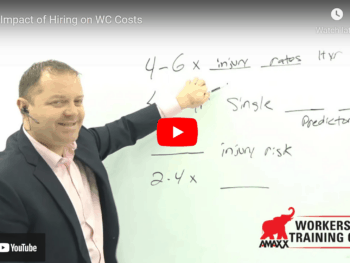Work comp, when it first started, paid only for obvious traumatic injuries. It did not pay for slow starting injuries (repetitive stress), occupational diseases, or physical injuries which, when they healed, left the worker with mental damage (depression, phobia, etc.).
Dissatisfaction With Life Often Leads To A Large Work Comp Claim
Eventually, all those became covered in nearly all states. But what about purely “mental stress” injuries which were not accompanied by physical symptoms? These, perhaps, account for more than half of all comp costs, but they have become masked by a comp system that insists that a treating doctor, at some point, link the claim to physical consequences, either at the start or the end of a claim.
What is the purely “mental stress” that causes so much increase in comp costs? It is nearly always dissatisfaction with a life situation, oftentimes not work related. A bad relationship often leads to a large claim with a large settlement.
Why do such situations become entrenched in the comp system? Well, there is no affordable way that an investigation can gather enough credible evidence to limit such claims, even though the correlation of bad claims with bad life situations is no secret to claims departments.
Every defense comp attorney has seen, at some point, an employer who tries to develop a defense, but has to drop it when it becomes far too obvious that it will require family members to disclose the darkest secrets and, moreover, to testify against each other. Obviously, an administrative disability system is not the best way to deal with this.
Do Not Hire Next Year’s Work Comp Claim
An employer is also poorly equipped to deal with this, but is far better than a claims unit. The first piece of advice is to recognize potential danger signs, preferably before, not after, the time of hire. The author said, twenty years ago, “Do not hire next year’s claim”. But he surely wasn’t the first to say it. Nor, judging from remarks posted on the web, has he been the last.
So improved hiring practices are the most effective way to deal with the most troublesome of all claim situations; dealing with dissatisfaction with life by trying to buy it off. It simply does not work.
But what can be done once you have hired next year’s claim, and the year is nearly over? Unfortunately, even the best outcome doesn’t come cheap, but if it is not viewed as a learning exercise it will become a “repetitive stress” experience for the employer, since such claims have a way of growing.
Danger Signs Should Be Detected In Interview
A small employer, with only a single office secretary as his work staff, discovered, the hard way, two valuable lessons. However, he learned both far too late to save his business. The first lesson was that a single part time clerk still has to be covered by work comp – and he didn’t have a policy. The other lesson was that a young employee, willing to work for a minimal wage, had too much education to be content with such a wage, unless something was very wrong. The worker, once out on a back claim, continued to remain on it for 18 years, and continues on it.
The real reason for the extended disability had nothing to do with back pain. Instead, there was a real desire to retreat from the world and live at home, never developing outside relationships at all. The danger signs should have been detected at the interview.
Employers must be aware that work comp is the law which is most tilted in favor of the worker. “In favor of” means that claims which probably should not be paid usually are paid. And that includes claims which are due to pre-existing “stress” with no relationship to work.
The lesson is, for employers, that an extra hour during an interview, can replace $100,000 in disability payments. (The case mentioned above has cost the employer $241,000 to date, with no end in sight. In return, the employer received a year of substandard work.)
Author: Attorney Theodore Ronca is a practicing lawyer from Aquebogue, NY. He is a frequent writer and speaker, and has represented employers in the areas of workers’ compensation, Social Security disability, employee disability plans and subrogation for over 30 years. Attorney Ronca can be reached at 631-722-2100. [email protected]
Editor Michael B. Stack, CPA, Director of Operations, Amaxx Risk Solutions, Inc. is an expert in employer communication systems and part of the Amaxx team helping companies reduce their workers compensation costs by 20% to 50%. He is a writer, speaker, and website publisher. www.reduceyourworkerscomp.com. Contact: [email protected].
©2013 Amaxx Risk Solutions, Inc. All rights reserved under International Copyright Law.











